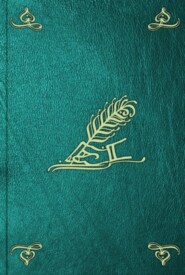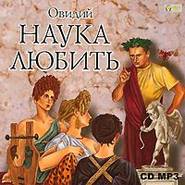По всем вопросам обращайтесь на: info@litportal.ru
(©) 2003-2024.
✖
The Amores; or, Amours
Настройки чтения
Размер шрифта
Высота строк
Поля
625 (return (#x5_x_5_i135))
[ Here.—Ver. 49. 1 Hie'here seems to be the preferable reading; alluding to Rome, in contradistinction to Corcyra.]
626 (return (#x5_x_5_i135))
[ His tearful eyes.—Ver. 49. He alludes to the custom of the nearest relative closing the eyes of the dying person.]
627 (return (#x5_x_5_i135))
[ The last gifts.—Ver. 50. The perfumes and other offerings which were thrown on the burning pile, are here alluded to. Tibullus says, in the same Elegy—]
'Non soror Assyrios cineri quæ dedat odores,]
Et Heat effusis ante sepulchra comis']
'No sister have I here to present to my ashes the Assyrian perfumes, and to weep before my tomb with dishevelled locks.' To this passage Ovid makes reference in the next two lines.]
628 (return (#x5_x_5_i135))
[ Thy first love.—Ver. 53. 'Prior;' his former love was Delia, who was forsaken by him for Nemesis. They are both represented here as attending his obsequies. Tibullus says, in the First Elegy of the First Book, addressing Delia:—]
Te spectem, suprema mihi cum venerit hora,]
Te teneam moriens, déficiente manu.]
Flebis et arsuro positum me, Delia, lecto,]
Tristibus et lacrymis oscula mista dabis.']
May I look upon you when my last hour comes, when dying, may I hold you with my failing hand. Delia, you will lament me, too, when placed on my bier, doomed to the pile, and will give me kisses mingled with the tears of grief.' To these lines Ovid evidently here refers. It would appear from the present passage, that it was the custom to give the last kiss when the body was laid on the funeral pile.]
629 (return (#x5_x_5_i135))
[ With his failing hand.—Ver. 58. Nemesis here alludes to the above line, and tells Delia, that she, herself, alone engaged his affection, as it was she alone who held his hand when he died.]
630 (return (#x5_x_5_i136))
[ Learned Catullus.—Ver. 62. Catullus was a Roman poet, a native of Verona. Calvus was also a Roman poet of great merit. The poems of Catullus and Calvus were set to music by Hermogenes, Tigellius, and Demetrius, who were famous composers. See the Tristia, Book ii. lines 427 and 431, and the Notes to the passages.]
631 (return (#x5_x_5_i136))
[ Prodigal of thy blood.—Ver. 64. He alludes to the fact of Gallus having killed himself, and to his having been suspected of treason against Augustus, from whom he had received many marks of kindness Ovid seems to hint, in the Tristia, Book ii. 1. 446, that the fault of Gallus was his having divulged the secrets of Augustus, when he was in a state o* inebriety. Some writers say, that when Governor of Egypt, he caused his name and exploits to be inscribed on the Pyramids, and that this constituted his crime. Others again, suppose that he was guilty of extortion in Egypt, and that he especially harassed the people of Thebea with his exactions. Some of the Commentators think that under the name 'amicus,' Augustus is not here referred to, inasmuch as it woulc seem to bespeak a familiar acquaintanceship, which is not known to have existed. Scaliger thinks that it must refer to some misunderstanding which had taken place between Gallus and Tibullus, in which the former was accused of having deceived his friend.]
632 (return (#x6_x_6_i2))
[ The rites of Ceres—Ver. 1. This festival of Ceres occurred on the Fifth of the Ides of April, being the 12th day of that month. See the Fasti, Book iv. 1. 393. White garments, were worn at this festival, and woollen robes of dark colour were prohibited. The worship was conducted solely by females, and all intercourse with men was forbidden, who were not allowed to approach the altars of the Goddess.]
633 (return (#x6_x_6_i3))
[ The oaks, the early oracles.—Ver. 9. On the oaks, the oracles of Dodona, see the Translation of the Metamorphoses, pages 253 and 467.]
634 (return (#x6_x_6_i3))
[ Having nurtured Jove.—Ver. 20. See an account of the education of Jupiter, by the Curetes, in Crete, in the Fourth Book of the Fasti, L 499, et seq.]
635 (return (#x6_x_6_i4))
[ Beheld Jasius.—Ver. 25. Iasius, or Iasion, was, according to most accounts, the son of Jupiter and Electra, and enjoyed the favour of Ceres, by whom he was the father of Plutus. According to the Scholiast on Theocritus, he was the son of Minos, and the Nymph Phronia. According to Apollodorus, he was struck dead by the bolts of Jupiter, for offering violence to Ceres. He was also said by some to be the husband of Cybele. He is supposed to have been a successful husbandman when agriculture was but little known; which circumstance is thought to have given rise to the story of his familiarity with Ceres. Ovid repeats this charge against the chastity of Ceres, in the Tristia, Book ii. 1. 300. See the Note to the passage.]
636 (return (#x6_x_6_i4))
[ Proportion of their wheat.—Ver. 30. With less corn than had been originally sown.]
637 (return (#x6_x_6_i5))
[ The law-giving Mims.—Ver. 41. Minos is said to have been the first who gave laws to the Cretans.]
638 (return (#x6_x_6_i10))
[ Late have the horns.—Ver. 6. This figure is derived from the horns, the weapons of the bull. 'At length I have assumed the weapons of defence.' It is rendered in a singular manner in Nisard's Translation, 'Trop tard, helas 1 J'ai connu l'outrage fait a mon front.' 'Too late, alas! I have known the outrage done to my forehead.'!!!]
639 (return (#x6_x_6_i10))
[ Have patience and endure.—Ver. 7. He addresses himself, recommending fortitude as his only cure.]
640 (return (#x6_x_6_i11))
[ The hard ground.—Ver. 10. At the door of his mistress; a practice which seems to have been very prevalent with the Roman lovers.]
641 (return (#x6_x_6_i11))
[ I was beheld by him.—Ver. 15. As, of courser, his rival would only laugh at him for his folly, and very deservedly.]
642 (return (#x6_x_6_i12))
[ As you walked.—Ver. 17. By the use of the word 'spatiantis,' he alludes to her walks under the Porticos of Rome, which were much frequented as places for exercise, sheltered from the heat.]
643 (return (#x6_x_6_i12))
[ The Gods forsworn.—Ver. 22. This forms the subject of the Third Elegy of the present Book.]
644 (return (#x6_x_6_i12))
[ Young mem at banquets.—Ver. 23. See the Fifth Elegy of the Second Book of the Amores.]
645 (return (#x6_x_6_i12))
[ She was not ill.—Ver. 26. When he arrived, he found his rival in her company.]
[ Here.—Ver. 49. 1 Hie'here seems to be the preferable reading; alluding to Rome, in contradistinction to Corcyra.]
626 (return (#x5_x_5_i135))
[ His tearful eyes.—Ver. 49. He alludes to the custom of the nearest relative closing the eyes of the dying person.]
627 (return (#x5_x_5_i135))
[ The last gifts.—Ver. 50. The perfumes and other offerings which were thrown on the burning pile, are here alluded to. Tibullus says, in the same Elegy—]
'Non soror Assyrios cineri quæ dedat odores,]
Et Heat effusis ante sepulchra comis']
'No sister have I here to present to my ashes the Assyrian perfumes, and to weep before my tomb with dishevelled locks.' To this passage Ovid makes reference in the next two lines.]
628 (return (#x5_x_5_i135))
[ Thy first love.—Ver. 53. 'Prior;' his former love was Delia, who was forsaken by him for Nemesis. They are both represented here as attending his obsequies. Tibullus says, in the First Elegy of the First Book, addressing Delia:—]
Te spectem, suprema mihi cum venerit hora,]
Te teneam moriens, déficiente manu.]
Flebis et arsuro positum me, Delia, lecto,]
Tristibus et lacrymis oscula mista dabis.']
May I look upon you when my last hour comes, when dying, may I hold you with my failing hand. Delia, you will lament me, too, when placed on my bier, doomed to the pile, and will give me kisses mingled with the tears of grief.' To these lines Ovid evidently here refers. It would appear from the present passage, that it was the custom to give the last kiss when the body was laid on the funeral pile.]
629 (return (#x5_x_5_i135))
[ With his failing hand.—Ver. 58. Nemesis here alludes to the above line, and tells Delia, that she, herself, alone engaged his affection, as it was she alone who held his hand when he died.]
630 (return (#x5_x_5_i136))
[ Learned Catullus.—Ver. 62. Catullus was a Roman poet, a native of Verona. Calvus was also a Roman poet of great merit. The poems of Catullus and Calvus were set to music by Hermogenes, Tigellius, and Demetrius, who were famous composers. See the Tristia, Book ii. lines 427 and 431, and the Notes to the passages.]
631 (return (#x5_x_5_i136))
[ Prodigal of thy blood.—Ver. 64. He alludes to the fact of Gallus having killed himself, and to his having been suspected of treason against Augustus, from whom he had received many marks of kindness Ovid seems to hint, in the Tristia, Book ii. 1. 446, that the fault of Gallus was his having divulged the secrets of Augustus, when he was in a state o* inebriety. Some writers say, that when Governor of Egypt, he caused his name and exploits to be inscribed on the Pyramids, and that this constituted his crime. Others again, suppose that he was guilty of extortion in Egypt, and that he especially harassed the people of Thebea with his exactions. Some of the Commentators think that under the name 'amicus,' Augustus is not here referred to, inasmuch as it woulc seem to bespeak a familiar acquaintanceship, which is not known to have existed. Scaliger thinks that it must refer to some misunderstanding which had taken place between Gallus and Tibullus, in which the former was accused of having deceived his friend.]
632 (return (#x6_x_6_i2))
[ The rites of Ceres—Ver. 1. This festival of Ceres occurred on the Fifth of the Ides of April, being the 12th day of that month. See the Fasti, Book iv. 1. 393. White garments, were worn at this festival, and woollen robes of dark colour were prohibited. The worship was conducted solely by females, and all intercourse with men was forbidden, who were not allowed to approach the altars of the Goddess.]
633 (return (#x6_x_6_i3))
[ The oaks, the early oracles.—Ver. 9. On the oaks, the oracles of Dodona, see the Translation of the Metamorphoses, pages 253 and 467.]
634 (return (#x6_x_6_i3))
[ Having nurtured Jove.—Ver. 20. See an account of the education of Jupiter, by the Curetes, in Crete, in the Fourth Book of the Fasti, L 499, et seq.]
635 (return (#x6_x_6_i4))
[ Beheld Jasius.—Ver. 25. Iasius, or Iasion, was, according to most accounts, the son of Jupiter and Electra, and enjoyed the favour of Ceres, by whom he was the father of Plutus. According to the Scholiast on Theocritus, he was the son of Minos, and the Nymph Phronia. According to Apollodorus, he was struck dead by the bolts of Jupiter, for offering violence to Ceres. He was also said by some to be the husband of Cybele. He is supposed to have been a successful husbandman when agriculture was but little known; which circumstance is thought to have given rise to the story of his familiarity with Ceres. Ovid repeats this charge against the chastity of Ceres, in the Tristia, Book ii. 1. 300. See the Note to the passage.]
636 (return (#x6_x_6_i4))
[ Proportion of their wheat.—Ver. 30. With less corn than had been originally sown.]
637 (return (#x6_x_6_i5))
[ The law-giving Mims.—Ver. 41. Minos is said to have been the first who gave laws to the Cretans.]
638 (return (#x6_x_6_i10))
[ Late have the horns.—Ver. 6. This figure is derived from the horns, the weapons of the bull. 'At length I have assumed the weapons of defence.' It is rendered in a singular manner in Nisard's Translation, 'Trop tard, helas 1 J'ai connu l'outrage fait a mon front.' 'Too late, alas! I have known the outrage done to my forehead.'!!!]
639 (return (#x6_x_6_i10))
[ Have patience and endure.—Ver. 7. He addresses himself, recommending fortitude as his only cure.]
640 (return (#x6_x_6_i11))
[ The hard ground.—Ver. 10. At the door of his mistress; a practice which seems to have been very prevalent with the Roman lovers.]
641 (return (#x6_x_6_i11))
[ I was beheld by him.—Ver. 15. As, of courser, his rival would only laugh at him for his folly, and very deservedly.]
642 (return (#x6_x_6_i12))
[ As you walked.—Ver. 17. By the use of the word 'spatiantis,' he alludes to her walks under the Porticos of Rome, which were much frequented as places for exercise, sheltered from the heat.]
643 (return (#x6_x_6_i12))
[ The Gods forsworn.—Ver. 22. This forms the subject of the Third Elegy of the present Book.]
644 (return (#x6_x_6_i12))
[ Young mem at banquets.—Ver. 23. See the Fifth Elegy of the Second Book of the Amores.]
645 (return (#x6_x_6_i12))
[ She was not ill.—Ver. 26. When he arrived, he found his rival in her company.]














